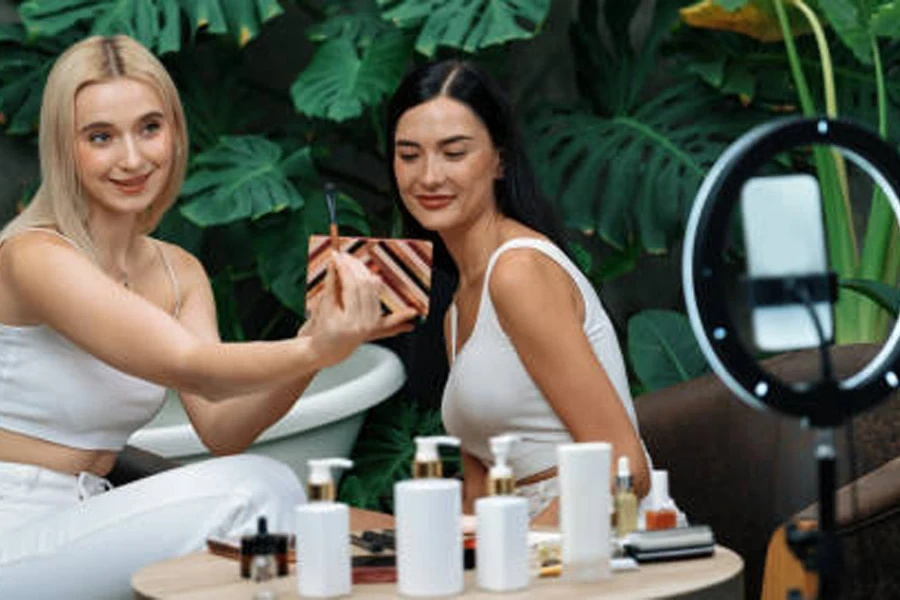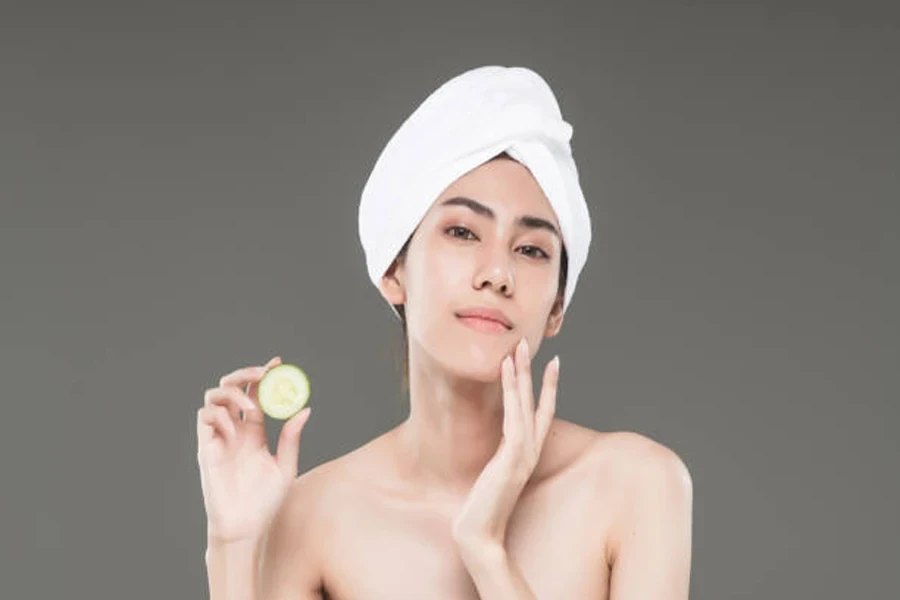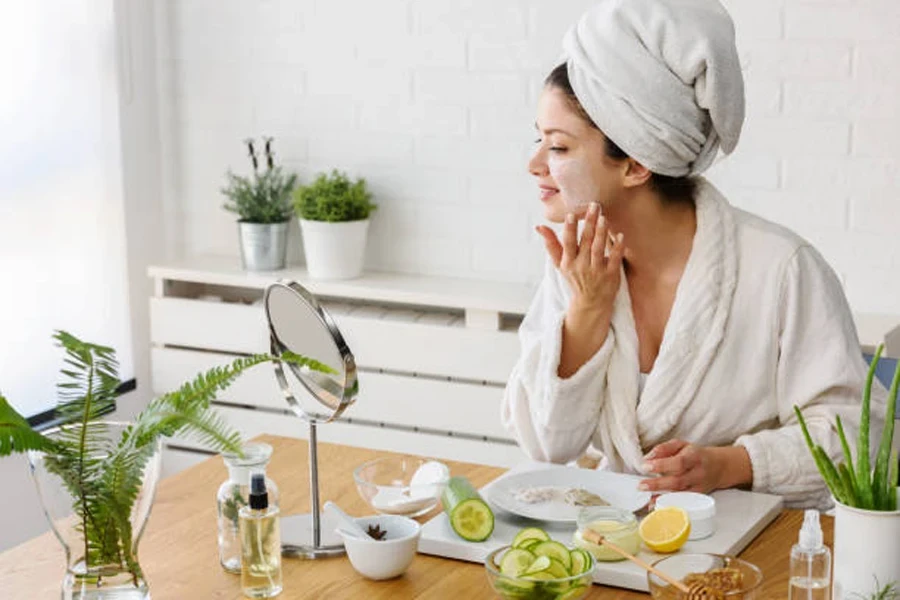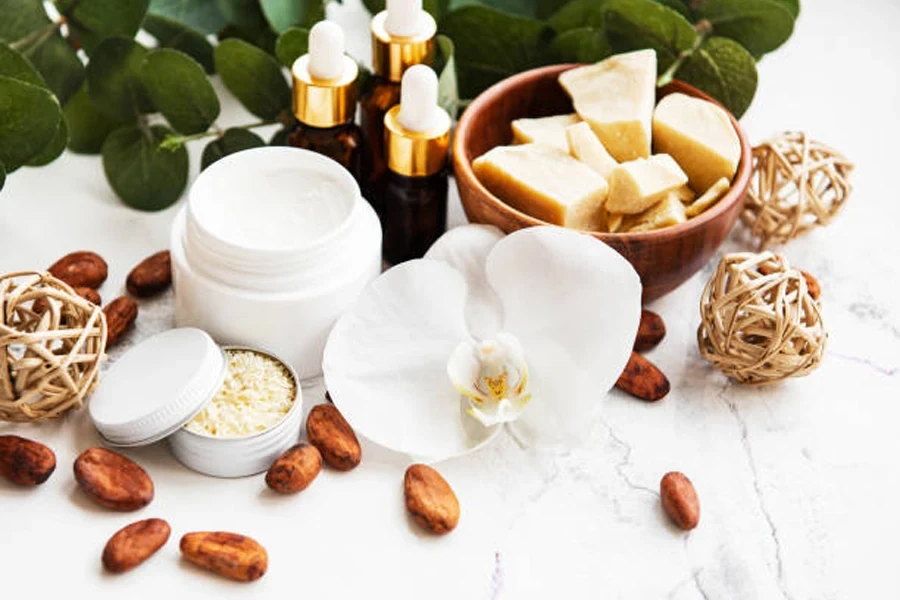In the era of global challenges and heightened stress levels, the beauty industry is witnessing a transformative shift towards holistic solutions that prioritize both mental and physical well-being. The mind-skin connection, also known as psychodermatology, has emerged as a key trend, highlighting the intricate relationship between emotional state and skin health. As brands explore innovative ways to address this growing concern, they are harnessing the power of stress-relieving ingredients, mental health-focused formulations, and ancient wellness rituals. This article will delve into the fascinating world of the mind-skin connection, uncovering the trends shaping this burgeoning field and the opportunities it presents for forward-thinking companies in the beauty industry.
Table of Contents
Stress less solutions
Beauty meets mental health
Third-culture rituals
The brain care boom
Action points

Stress less solutions
The link between stress and skin health has become increasingly apparent, with studies revealing the detrimental effects of cortisol on the skin. Elevated cortisol levels, often triggered by chronic stress, can lead to a myriad of skin concerns, including inflammation, acne, and eczema. In response to this growing problem, beauty brands are developing innovative products that incorporate stress-relieving ingredients and promote mindful skincare routines.
One approach to combating stressed skin is the use of cortisol-balancing ingredients. For example, some brands have harnessed the power of adaptogens, such as ashwagandha and rhodiola, which are known for their ability to help the body adapt to stress. By incorporating these ingredients into skincare formulations, brands aim to provide a targeted solution to stress-induced skin issues.
Another trend in the realm of stress less solutions is the emphasis on intentional skincare routines. Brands are encouraging consumers to view their skincare regimen as a moment of self-care and relaxation. By incorporating mindfulness techniques, such as deep breathing exercises or facial massages, into their daily routines, individuals can not only improve their skin health but also find a sense of calm and tranquility amidst the chaos of modern life.
As the demand for stress less solutions continues to grow, it is crucial for beauty brands to collaborate with experts in the field of psychodermatology. By partnering with dermatologists, psychologists, and mindfulness practitioners, brands can develop products and resources that effectively address the mind-skin connection while providing consumers with the tools they need to achieve optimal skin health and overall well-being.

Beauty meets mental health
The intersection of beauty and mental health has become increasingly important, as individuals grapple with the emotional impact of primary and secondary psychiatric skin conditions. Studies have shown that skin conditions such as acne, atopic dermatitis, psoriasis, and rosacea can have a profound effect on mental well-being, leading to lowered self-confidence, anxiety, and even depression.
In light of this growing concern, beauty brands are recognizing the need for inclusive and empowering solutions that address both the physical and emotional aspects of skin health. By featuring unfiltered images of diverse skin conditions and promoting body positivity, brands can help to challenge societal stigmas and create a more accepting and supportive environment for those struggling with skin-related mental health issues.
When it comes to product development, brands are focusing on formulations that soothe and nourish compromised skin, while also promoting a sense of comfort and self-care. Ingredients such as anti-inflammatory botanicals and skin-restoring ceramides can help to alleviate the physical symptoms of sensitive skin conditions, while the act of engaging in a nurturing skincare routine can provide a much-needed moment of relaxation and self-love.
As the conversation around beauty and mental health continues to evolve, it is essential for brands to prioritize inclusivity, representation, and empathy in their approach. By partnering with mental health experts and fostering open dialogue within their communities, beauty brands can play a vital role in supporting the emotional well-being of their customers and creating a more compassionate and understanding world.

Third-culture rituals
As the beauty industry continues to evolve, there has been a growing appreciation for the wisdom and traditions of ancient wellness practices from around the world. The concept of the mind-skin connection, while relatively new to modern consumers, has been deeply ingrained in many cultures for centuries. This has led to a rise in third-culture beauty rituals that combine time-honored techniques with contemporary self-care practices.
Brands are increasingly looking to traditional healing modalities, such as Ayurveda, Traditional Chinese Medicine, and Japanese wellness philosophies, for inspiration in product development and ritual creation. By respectfully incorporating these ancient practices into modern skincare routines, brands can offer consumers a more holistic and culturally rich approach to beauty and well-being.
However, it is crucial for brands to approach third-culture rituals with sensitivity and respect, ensuring that they are not engaging in cultural appropriation. Collaborating with experts and practitioners from the cultures of origin can help to ensure that the traditions are being honored and preserved authentically. By taking a community-led approach and amplifying the voices of those who have a deep understanding of these rituals, brands can create meaningful and inclusive products that resonate with consumers on a deeper level.
Ultimately, the incorporation of third-culture rituals into the beauty industry represents an opportunity for brands to celebrate diversity, foster cultural appreciation, and promote a more interconnected and empathetic approach to self-care. By embracing the rich tapestry of global wellness traditions, the beauty industry can play a role in bridging cultures and supporting the mind-skin connection in a truly authentic and transformative way.

The brain care boom
As the focus on mental well-being continues to grow, a new category has emerged within the beauty and wellness industry: brain care. This innovative sector combines the power of ingestible solutions, such as supplements and nootropics, to support cognitive function, emotional balance, and overall neurological health. With the global brain health supplements market projected to reach remarkable heights in the coming years, it is clear that consumers are increasingly seeking out products that nourish not only their bodies but also their minds.
Brain care products often harness the potential of natural ingredients, such as functional mushrooms and adaptogenic herbs, which have been used for centuries in traditional medicine to promote mental clarity, resilience, and well-being. By combining these time-tested ingredients with cutting-edge scientific research, brain care brands are developing targeted formulations that cater to the unique needs of the modern consumer, addressing concerns such as stress, anxiety, and cognitive decline.

However, as with any emerging category, education and transparency are paramount. Brands operating in the brain care space must prioritize collaborations with neuroscientists, psychologists, and other experts to ensure the efficacy and safety of their products. By providing consumers with clear, science-backed information and resources, brands can help to demystify the concept of brain care and empower individuals to make informed decisions about their mental well-being.
As the brain care boom continues to gain momentum, there is a significant opportunity for beauty and wellness brands to expand their offerings and cater to the growing demand for products that support cognitive health. By approaching this category with a commitment to innovation, education, and holistic well-being, brands can position themselves at the forefront of this exciting new frontier in the mind-skin connection.

Action points
As the beauty industry navigates the evolving landscape of the mind-skin connection, there are several key action points that brands should consider to effectively capitalize on this growing trend. First and foremost, partnering with experts in the fields of psychology, dermatology, and neuroscience is essential to developing products and rituals that are grounded in scientific research and deliver tangible benefits to consumers. By collaborating with professionals, brands can ensure the credibility and efficacy of their offerings while also gaining valuable insights into the complex relationship between mental well-being and skin health.
Another crucial aspect of embracing the mind-skin connection is fostering inclusive and supportive communities. Brands should strive to create safe spaces, both online and offline, where individuals can openly discuss their experiences, challenges, and triumphs related to skin and mental health. By promoting honest conversations and representation, brands can help to break down stigmas and cultivate a sense of belonging among their customers.
Education is also a key component of successfully navigating the mind-skin connection trend. Brands should prioritize providing consumers with accessible, engaging, and informative content that helps them understand the link between emotional well-being and skin health. This can include workshops, webinars, blog posts, and social media campaigns that offer practical tips, evidence-based insights, and expert advice. By empowering consumers with knowledge, brands can foster a more proactive and holistic approach to skincare and mental wellness.
Finally, when exploring the rich tapestry of ancient wellness rituals and traditional practices, brands must approach these traditions with the utmost respect and cultural sensitivity. Collaborating with practitioners and experts from the cultures of origin, giving credit where due, and ensuring that the integrity of these rituals is maintained should be top priorities. By honoring the roots of these practices and promoting cultural appreciation rather than appropriation, brands can create meaningful and authentic experiences that resonate with consumers on a deeper level.

Conclusion
The mind-skin connection represents a transformative shift in the beauty industry, one that acknowledges the intricate relationship between emotional well-being and skin health. As brands continue to explore this frontier, it is crucial to approach product development, community building, and cultural exploration with empathy, respect, and a commitment to science-backed solutions. By prioritizing partnerships with experts, fostering inclusive dialogues, and investing in consumer education, beauty brands can not only capitalize on this growing trend but also contribute to a more holistic, compassionate, and enlightened approach to self-care. Ultimately, the mind-skin connection invites us to recognize the profound interconnectedness of our mental and physical well-being, offering a path towards a more harmonious and fulfilling relationship with ourselves and the world around us.




